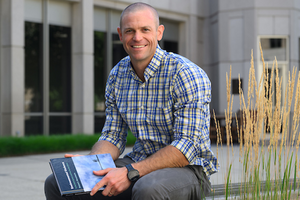“Environmental Violence” wins international recognition
Published: April 12, 2023 / Author: Kroc Institute
Fresh off his recent book launch for Environmental Violence: In the Earth System and the Human Niche (Cambridge University Press: 2022), Richard (Drew) Marcantonio (Ph.D. ‘21) has received international recognition for his work from the Hans Gunter Brauch Foundation (HGBS) by way of its 2023 International Science Prize for Peace and Ecology in the Anthropocene.

Drew Marcantonio
The annual award honors scholars who have made innovative scientific contributions related to a determined theme, which changes from year to year. This year’s theme was “Climate Change and Conflict,” making Marcantonio’s book a natural contender.
Marcantonio will receive a contract award for an unpublished authored or edited book and an honorarium.
“It’s really exciting,” Marcantonio said. “It’s affirming to feel that there is a sense of impact with the book and in the conversations it’s creating.”
Environmental Violence: In the Earth System and the Human Niche explains the concept of environmental violence (EV) and the harm that humanity inflicts upon itself through pollution emissions.The theory suggests that causes and inequalities of EV can be attributed to a relatively small portion of the human population and to a fairly circumscribed set of behaviors. The EV-model is designed to disrupt the cycle of violence with effective policies and real change.
The award required that submissions be original text authored solely by the applicant in English and published after 2020, in either a peer-reviewed journal or as a peer-reviewed book chapter. If the work was unpublished, it must be an original text such as an article, report or book based on a Ph.D. dissertation.
A global jury of 12 members assessed submissions from around the world to determine three finalists. In this award series, one first-place winner and two international recognitions were selected.
“The fact that someone read the book and took enough away from it to nominate it is wonderful.” Marcantonio said. “My hope is that we can really begin recognizing our own contributions to environmental violence. If you take it seriously and can do your part, it enforces both individual and collective change.”
While the awarded book contract’s topic is open-ended, the final product will be published by Springer Nature Switzerland as part of the series, The Anthropocene: Politics – Economy – Society – Science, by December 2025.
Marcantonio has already submitted his proposal and will serve as editor to collate research and white papers from a series of upcoming conferences. Drawing especially from the active cases of Colombia, Yemen and Sudan, his focus will be on how to account for and regenerate communities and ecosystems in peace accords. He also hopes to involve colleagues from the Kroc Institute, such as Josefina Echavarría Alvarez, associate professor of the practice and director of the Peace Accords Matrix (PAM) and Keough’s new Sustainability and Human Rights Initiative.
“Environment and private industry are two of the most concerning issues for negotiators in areas facing conflict and trying to reach peace,” said Marcantonio. “There isn’t a lot of scholarship on this topic yet.”
Marcantonio’s forthcoming book will address a variety of topics regarding formal peace accords, including environmental management, institutional development, private industry and methods for tracking environmental issues arising from conflict and peace.
“This will be a how-to, in a way, incorporating current best practices,” he said. “The book will also include case studies to demonstrate the efficacy of these practices as they relate to the environment in peace accords. Bringing the environment into the center of peace negotiations is an important next step to ensure a just, sustainable peace where humans and the environment can flourish.”
Marcantonio is a researcher, teacher, and practitioner focused on regenerative and durable livelihoods, environmental management and policy, environmental and other violence, and peacebuilding. He graduated with a Ph.D. in Peace Studies and Anthropology from the University of Notre Dame in 2021. He currently serves as assistant teaching professor at the Mendoza College of Business’s Meyer Business on the Frontlines Program at the University of Notre Dame.
Originally posted on Kroc Institute News.




